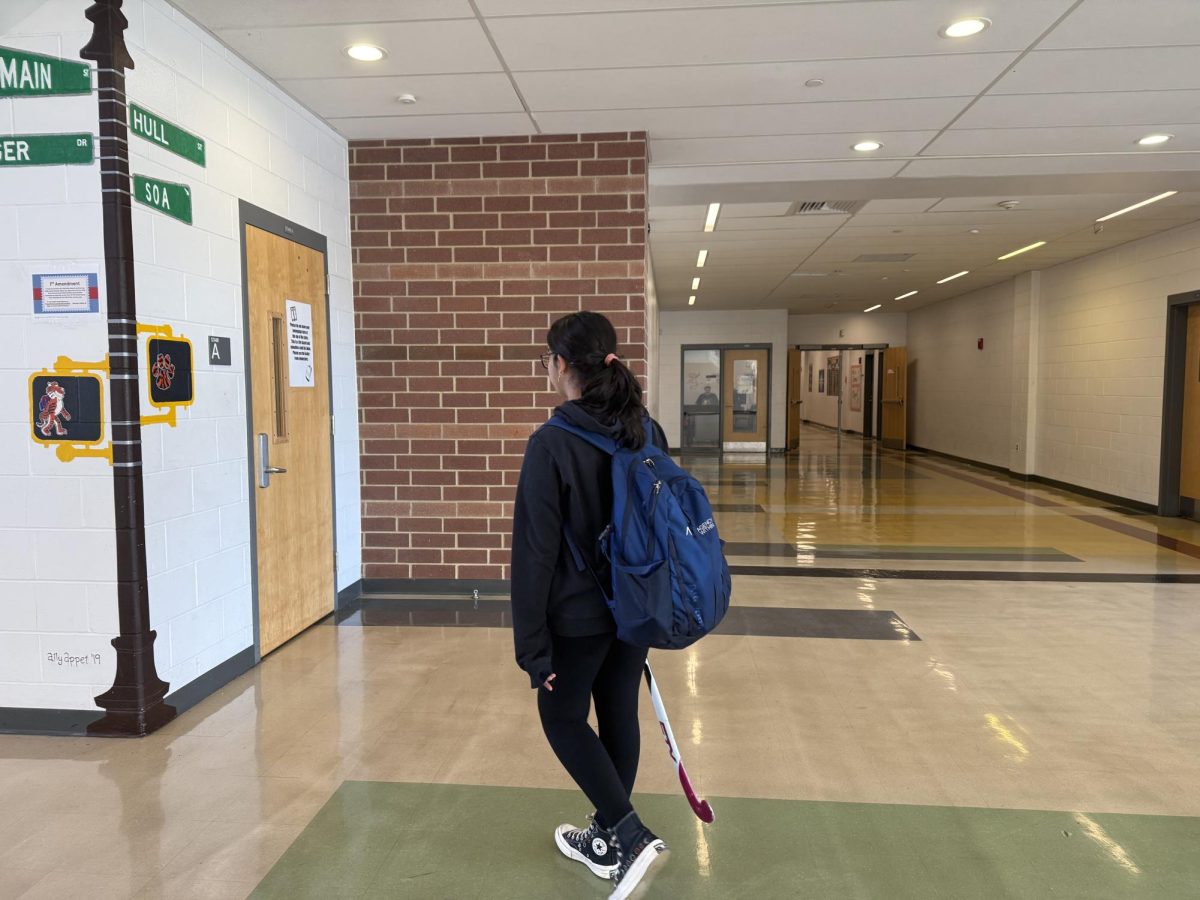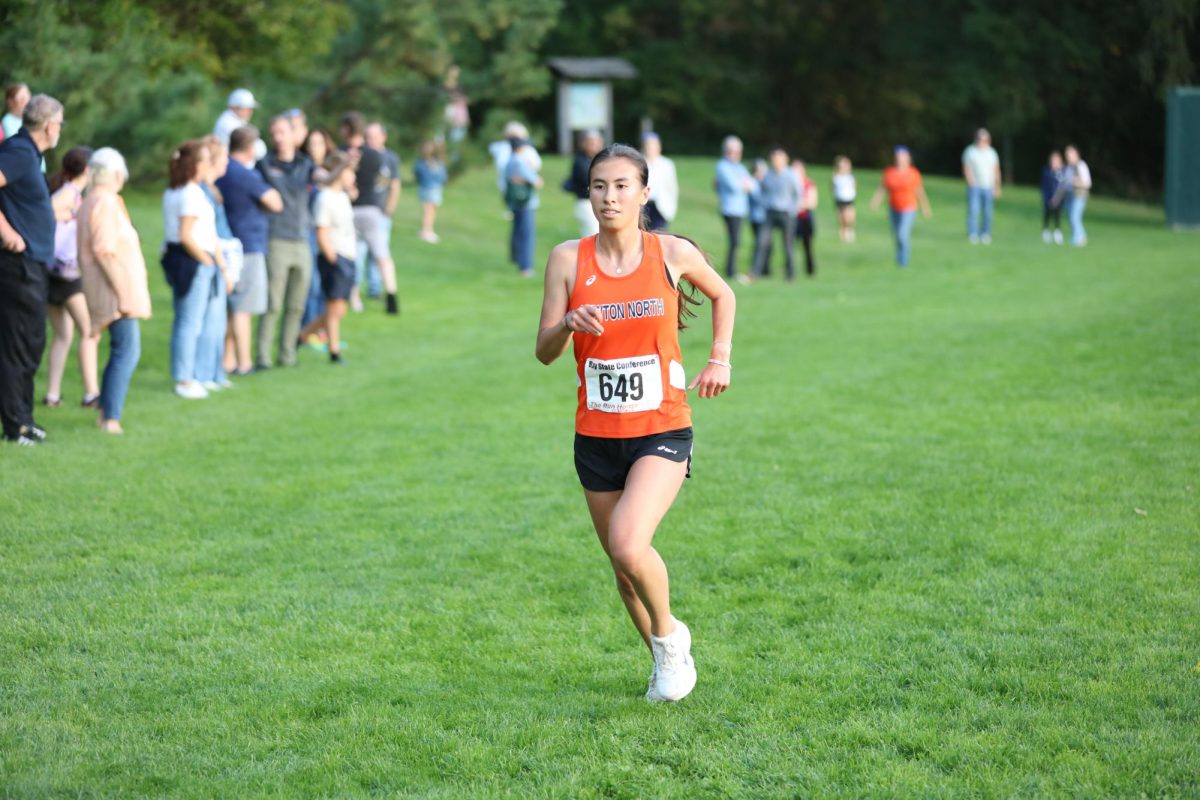 [/media-credit]
[/media-credit]
- Junior Sophie Kaplan and senior May Singleton-Kahn discuss submitted artwork.
by Perrin Stein and Fatema Zaidi
The house on Alexander Street always creaked alive as the sun climbed towards its throne in the sky,” senior Madeline Aqualina wrote as the opening line of her short story “On Alexander and Eden.”
This piece is among the 88 pages of content that range from photographs to drawings to poems in the 2010-2011edition of Thoughtprints literary magazine. Everything is written, edited and anthologized by students.
Each spring, the Thoughtprints staff produces a magazine, calendar and CD, which represent the best of the submitted work. Any student, even those who do not attend meetings, can submit pieces.
Aqualina, the editor in chief and the arts editor, is involved in the magazine because, “I loved making art, reading and writing,” she said.
“It seemed like a perfect fit, talking to other like-minded students, talking about art and also spreading the word about the art community at my school.”
Over the course of her time at this school, Aqualina’s love for Thoughtprints has grown, and she has become more involved in the magazine, she said.
Since freshman year, Aqualina has attended Thoughtprints meetings with her long time friend, senior Lior Percher, the music editor.
“I remember being really nervous at the first meeting, but by the end of the year, I met so many upperclassmen and felt so much more at home at North,” Aqualina said.
As editor in chief, Aqualina deals with logistics and guides discussions, she said. As the arts editor, she leads discussions on submitted artwork and relays feedback to the artists.
Last year, Aqualina was the production editor, so she designed and laid out all the pages of the 2010-2011 magazine.
“Although we have different titles, all the editors work together to spread the word about Thoughtprints by making posters, recruiting members and generally being crazy enthusiastic,” she said.
Aqualina said that she loves being an editor of Thoughtprints because she is always proud of the final product.
“I remember when the magazine last year was printed, after a crazy spring of trying to design it,” she said. “People who bought it said it looked really beautiful, and they were looking at the art and reading the poetry and stories every night.
“I felt relieved to be done but also proud of the hours I had put in to yield something that people were enjoying.”
English teacher Neil Giordano, the adviser, said he feels the same way about Thoughtprints as Aqualina does.
“When I see it come off the printing press every year, I am proud to show it around to the faculty and staff of the school.”
According to Giordano, Thoughtprints represents the skills and immense creativity of the students at this school. “North students are wildly talented. We produce a fine magazine in comparison to a lot of high school literary magazines elsewhere,” he said.
In 2009, Thoughtprints won the All-New England Award for Best Magazine from the New England Scholastic Press Association, which is given for “overall editorial and design excellence,” Giordano said.
To produce the magazine, the editors meet in homeroom, and interested students attend meetings on Sunday evenings at editors’ houses, according to Giordano.
At the meetings, students discuss the anonymously submitted work to decide whether it should be included in the magazine.
Because there is so much content submitted, Giordano is helping the editors to decide whether to add a winter publication in addition to the current spring one.
To choose content for Thoughtprints, students use the same process for each submitted piece.
First, everyone reads the piece aloud, listens to it or looks at it, depending on its medium. To begin the discussion, members blurt out words that come to mind, such as “contrast” or “color,” according to Aqualina. Then, an editor asks students to elaborate.
During the discussion, whenever people agree with a comment they snap, and whenever people disagree they make a jellyfish with their hands. These gestures often invoke laughter, Aqualina said.
Senior Isabel Meigs, the literary editor, went to her first meeting sophomore year, and “it proved as cool as advertised, so I’ve barely missed a meeting since,” she said.
“Thoughtprints is really fun, and despite accusations of pretentiousness, we’re really normal, nice people, and we encourage everyone to participate, whether it’s coming to meetings or submitting your work.”
Meigs’ most memorable experience at Thoughtprints was the first time one of her stories was accepted.
“Whenever everyone responds well to a piece and has a really good discussion about it, and it’s yours, you can sit in the corner and let the praise rain down. It’s sweet.”








































